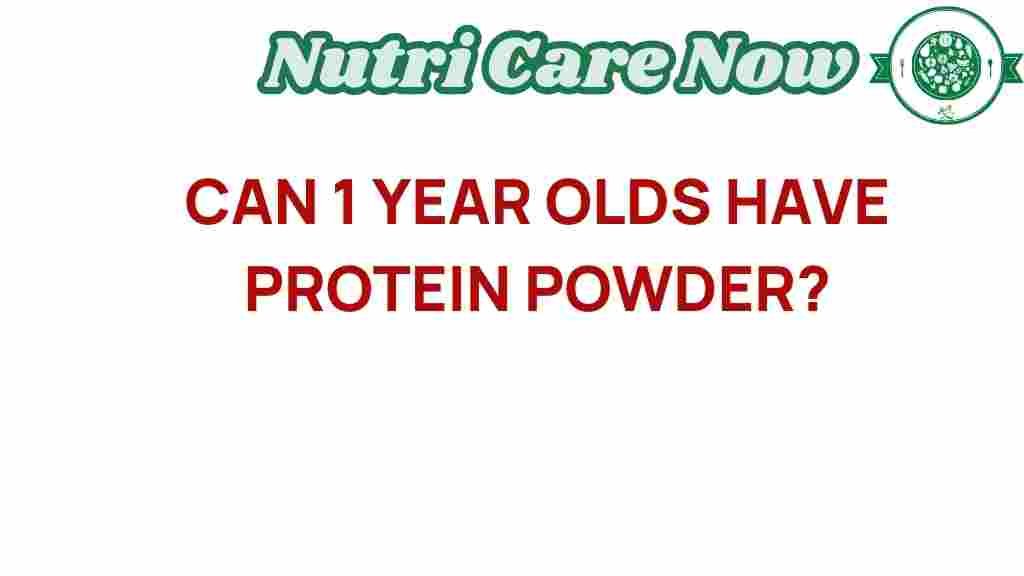The Protein Powder Dilemma: Is It Safe for 1-Year-Olds?
As parents, ensuring our toddlers receive proper nutrition is one of our top priorities. With the rise of health supplements, particularly protein powder, many parents wonder about its role in toddler nutrition. The question arises: is protein powder safe for 1-year-olds? This article aims to provide clarity on this topic based on health safety, dietary guidelines, and practical parenting tips.
Understanding Protein Needs in Toddlers
Protein is essential for growth and development in children. It plays a crucial role in building muscles, supporting the immune system, and facilitating the production of hormones and enzymes. For toddlers, the recommended dietary allowance (RDA) for protein varies based on age and weight:
- Children aged 1 to 3 years: approximately 13 grams of protein per day.
- Children aged 4 to 8 years: approximately 19 grams of protein per day.
Most toddlers can meet their protein needs through a balanced diet that includes a variety of foods. Good sources of protein for toddlers include:
- Meat, poultry, and fish
- Dairy products like milk, yogurt, and cheese
- Eggs
- Legumes such as beans and lentils
- Nuts and seeds (be cautious with whole nuts due to choking hazards)
The Role of Protein Powder in Toddler Nutrition
Protein powders are often marketed as convenient sources of protein, especially for athletes and adults looking to enhance their diets. However, when it comes to toddler nutrition, the use of protein powder raises several concerns:
- Excess Protein Intake: Most toddlers do not require additional protein beyond what they can obtain from a balanced diet. Excessive protein can strain the kidneys and lead to dehydration.
- Imbalanced Nutritional Profile: Protein powders often lack the essential vitamins and minerals found in whole foods, leading to potential deficiencies.
- Added Ingredients: Many protein powders contain added sugars, artificial flavors, and other ingredients that may not be suitable for young children.
Health Safety Concerns
When considering dietary supplements, including protein powder, it’s essential to prioritize health safety. Here are some critical points to keep in mind:
- Allergies: Some protein powders are derived from common allergens like whey (dairy) or soy. Always check labels and consult with a pediatrician if you suspect allergies.
- Contaminants: Some protein powders have been found to contain harmful substances such as heavy metals. Choose products that are tested for purity and safety.
- Consultation with a Pediatrician: Before introducing any supplements, it is vital to consult with your child’s pediatrician to ensure it aligns with their health needs.
Dietary Guidelines for Protein Intake in Toddlers
The American Academy of Pediatrics (AAP) recommends that toddlers receive their nutrition primarily from whole foods rather than supplements. They emphasize the importance of a varied diet rich in fruits, vegetables, grains, proteins, and healthy fats. Here are some guidelines to consider:
- Focus on Whole Foods: Encourage a diet that includes natural sources of protein.
- Monitor Portion Sizes: Be mindful of portion sizes to prevent overconsumption of protein.
- Limit Processed Foods: Avoid processed foods that often contain hidden sugars and unhealthy fats.
Practical Parenting Tips
Here are some practical tips for ensuring your toddler gets sufficient protein safely:
- Variety is Key: Offer a range of protein sources to keep meals interesting and nutritionally balanced.
- Involve Your Toddler: Let your child help with meal prep to encourage interest in healthy foods.
- Be Patient: It may take several attempts for toddlers to accept new foods, including protein-rich options.
When to Consider Protein Supplements
While whole foods should be the primary source of nutrition for toddlers, there are specific situations where protein powder might be considered under professional guidance:
- Medical Conditions: If a child has a medical condition that affects their ability to consume or absorb nutrients, a healthcare provider might recommend supplements.
- Food Allergies: In cases where dietary restrictions limit protein sources, a supplement might help meet protein needs.
- Increased Activity Levels: Active toddlers may have higher protein requirements, but this should be assessed on an individual basis.
Troubleshooting Common Concerns
If you’re considering protein powder for your toddler, here are some common concerns and how to address them:
- Low Appetite: If your toddler is a picky eater, focus on nutrient-dense foods and avoid filling them up with less nutritious options.
- Weight Concerns: Consult your pediatrician if you are worried about your child’s weight or growth patterns.
- Constipation: Excessive protein intake can lead to constipation. Ensure your child is also getting enough fiber from fruits, vegetables, and whole grains.
Conclusion
In summary, while protein is vital for toddler nutrition, the use of protein powder for 1-year-olds is generally not recommended due to health safety concerns and the availability of adequate protein through whole foods. Parents should focus on providing a balanced diet that meets their child’s nutritional needs without the reliance on dietary supplements.
For parents considering protein powder, it is crucial to consult with a pediatrician to evaluate your child’s specific needs and to ensure safety. Remember, fostering healthy eating habits early on is key to your child’s future health and development.
For more parenting tips and insights on child development, visit our parenting resource page.
To learn more about dietary guidelines for children, check the CDC’s recommendations.
This article is in the category Health and created by NutriCareNow Team
